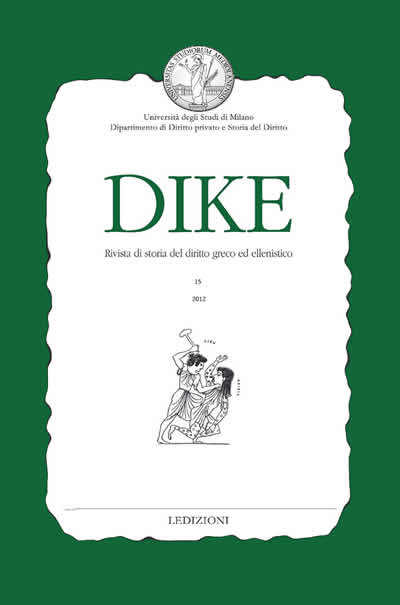WOMEN’S PROPERTY AT GORTYN
DOI:
https://doi.org/10.13130/1128-8221/3492Abstract
In two earlier articles (Gagarin 2008, 2012) I argued first, that women could own property in their own right and could manage and dispose of it without the need of a “guardian” (kyrios), such as we find at Athens, that they could appear in court on their own as plaintiffs or defendants, and that they had more rights in choosing a husband than Athenian women. Second, we can infer from the wording of the laws at Gortyn that women’s rights in these respects had only recently been granted or had been expanded, and that resistance to these greater rights led to greater protection for women in the Gortyn Code. Third, the Code suggests, however, that despite these greater rights, most women probably continued to live fairly traditional lives, allowing men to manage their property as they always had. This paper defends these views against objections raised by Alberto Maffi in Maffi 2012 and in this same journal (Dike 15), as well as by two anonymous readers.In due articoli precedenti (Gagarin 2008, 2012) ho sostenuto che le donne potevano essere proprietarie di beni, e potevano amministrarli e disporre di essi senza bisogno dell’intervento di un tutore (kyrios), quale troviamo invece ad Atene; che potevano stare in giudizio per proprio conto sia in veste di attore che di convenuto, e che avevano maggiore libertà di scegliersi un marito rispetto alle donne ateniesi. In secondo luogo possiamo desumere dal testo delle leggi di Gortina che i diritti delle donne riguardo a questi punti sono stati garantiti o addirittura accresciuti solo in tempi recenti, e che la resistenza a questo ampliamento dei loro diritti ha condotto a una protezione accentuata delle donne nel Codice di Gortina. In terzo luogo il Codice induce a ritenere che, nonostante questo accrescimento di diritti, la maggior parte delle donne probabilmente continuava a vivere secondo canoni tradizionali, consentendo agli uomini di amministrare i loro beni come era sempre avvenuto. Questo articolo ribadisce questi punti di vista contro le obiezioni sollevate da Alberto Maffi 2012 e in questo stesso numero della rivista (Dike 15), nonché da due anonimi revisori.
Downloads
I dati di download non sono ancora disponibili.
Dowloads
Pubblicato
2013-12-12
Come citare
Gagarin, M. (2013). WOMEN’S PROPERTY AT GORTYN. Dike - Rivista Di Storia Del Diritto Greco Ed Ellenistico, 15, 73–92. https://doi.org/10.13130/1128-8221/3492
Fascicolo
Sezione
Articoli
Licenza
- Gli autori mantengono i diritti sulla loro opera e cedono alla rivista il diritto di prima pubblicazione dell'opera, contemporaneamente licenziata sotto una Licenza Creative Commons - Attribuzione - Condividi allo stesso modo che permette ad altri di condividere l'opera indicando la paternità intellettuale e la prima pubblicazione su questa rivista.
- Gli autori possono aderire ad altri accordi di licenza non esclusiva per la distribuzione della versione dell'opera pubblicata (es. depositarla in un archivio istituzionale o pubblicarla in una monografia), a patto di indicare che la prima pubblicazione è avvenuta su questa rivista.
- Gli autori possono diffondere la loro opera online (es. in repository istituzionali o nel loro sito web) prima e durante il processo di submission, poichè può portare a scambi produttivi e aumentare le citazioni dell'opera pubblicata (Vedi The Effect of Open Access).





